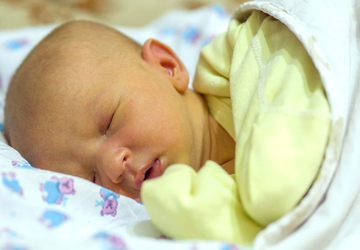What to do if your baby has jaundice?
Neonatal jaundice is a common condition in newborns that usually manifests itself in the first few days after birth. It is characterized by yellowing of the skin and sclera due to hyperbilirubinemia. Knowing how to treat infant jaundice is essential to effectively relieve the condition and ensure the health of your newborn.
Symptom Recognition
To determine if your newborn has jaundice, observe the following symptoms:
- Yellow pigmentation of the dermis and sclera
- Inadequate feeding or difficulty waking up the newborn
- Darkened urine (a sign of elevated bilirubin levels)
- Achromatic chair
If these phenomena are observed, knowing how to deal with infant jaundice and seek medical advice immediately is important.
When to See a Doctor

While mild jaundice usually gets better on its own, severe jaundice can have serious consequences. It is imperative to see a doctor if:
- The newborn is a striking yellow or orange colour
- The discolouration extends to the limbs or abdominal area
- The newborn screams sharply
- There are signs of malnutrition or lethargy
Prompt detection and treatment of infant jaundice can prevent complications such as kernicterus, a dangerous neurological condition caused by elevated bilirubin levels.
Home Treatment Strategies
For mild cases of neonatal hyperbilirubinemia, treating infant jaundice at home is a viable option. Here are some effective methods:
- Frequent breastfeeding: Make sure the newborn is fed 8 to 12 times a day to speed up the metabolic breakdown of bilirubin.
- Sunlight exposure: Expose the newborn to indirect sunlight. For a short period during the day, place the newborn near an opening that is penetrated by filtered sunlight.
- Monitoring: Regularly check the newborn's skin surface and conjunctiva for signs of worsening jaundice.
Familiarizing with the necessary protocols for treating neonatal jaundice at home can significantly shorten recovery time.
Medical Intervention
Sometimes, home treatment may not be sufficient, and medical intervention may be required. Treatment options for infant jaundice include:
- Phototherapy: The most common treatment involves placing the newborn under a special blue light to promote photooxidation of bilirubin in the skin.
- Exchange transfusion: In critical cases, the newborn may need a transfusion to replace the blood with fresh blood with normal bilirubin levels.
- Intravenous immunoglobulin (IVIg): This treatment is used when the newborn's jaundice is caused by hemolytic disease due to blood type incompatibility between the mother and the newborn and is considered one of the best treatments for infant jaundice.
Preventing Severe Jaundice
Although jaundice is often unavoidable, preventive measures can be taken to prevent severe manifestations:
- Early and frequent feeding: Regular breastfeeding can help lower bilirubin levels.
- Routine checkups: Regular visits to the paediatrician can help detect and treat jaundice early.
- Monitoring your baby: Carefully observe your newborn's feeding habits and alertness.
Signs and First Steps of Mild Jaundice
For milder cases of neonatal jaundice, quick recognition and response are crucial. How to recognize and treat mild jaundice:
Observe Skin Colour Changes
- Examine your baby's skin under natural light to detect yellowish hues.
- Pay close attention to the dermis and gums.
- Check the chest area and extremities for discolouration.
Hydration and Nutrition
- Frequent feedings: Increase the feedings to 10-12 times daily.
- Hydration: Ensure your newborn gets enough fluids, as dehydration can worsen jaundice.
Natural Sunlight Therapy
- Indirect sunlight: Expose your newborn to indirect sunlight therapy for 10-15 minutes several times daily.
- Safe Sunlight Exposure: Place your newborn near a window where sunlight is filtered to avoid direct UV rays.
You can ensure your baby's vitality and strength by following these instructions and understanding the neonatal jaundice treatment options. Keep a close eye on your newborn, provide regular nutrition, and seek medical advice if symptoms persist or worsen. This holistic approach will help you manage the disease with confidence and diligence.
Advanced Home Remedies
While home remedies cannot replace medical advice, certain measures can help treat infant jaundice:
Herbal Interventions
- Chamomile tea: Some breastfeeding mothers find that drinking and breastfeeding can improve bilirubin levels.
- Dandelion root: A natural diuretic that can help eliminate excess bilirubin.
Dietary Modifications
- Maternal diet: A diet rich in antioxidants, such as berries and leafy greens, can help breastfeeding mothers.
- Probiotic supplements: Ask your paediatrician about how probiotics can promote digestive health in newborns.
Importance of Monitoring and Follow-Up Care

Regular monitoring and follow-up care from a healthcare professional is essential for effectively treating infant jaundice.
Paediatrician Appointments
- Schedule regular consultations with your paediatrician to accurately check bilirubin levels.
- Monitor bilirubin levels at home using a transcutaneous bilirubinometer, if available.
Identifying Severe Symptoms
- Pay close attention to sleepiness, difficulty feeding, or high-pitched crying.
- Watch for signs that jaundice is spreading or worsening.
Medical Interventions Beyond Phototherapy
In cases where home remedies prove insufficient, advanced treatment modalities may be essential for treating hyperbilirubinemia in infants:
Phototherapy Technologies
- BiliBlanket: This portable device allows for uninterrupted phototherapy at home, allowing parents to cuddle and feed their child during treatment.
Parenteral Interventions
- Intravenous fluids are used to maintain fluid balance and promote the excretion of bilirubin.
- Albumin infusions: These are used concurrently with phototherapy to bind bilirubin in the vascular environment.
Invasive Measures
- Liver biopsy: In rare cases, it may be necessary to sample liver tissue to identify the underlying pathophysiological substrate causing jaundice.
Long-Term Management and Care
After the initial phase of treatment of infantile jaundice, long-term care is essential to ensure there are no sequelae:
Developmental Monitoring
- Carefully track your newborn's developmental milestones and watch closely for signs of growth retardation.
- Have regular pediatric checkups to monitor overall health and developmental progress.
Nutrition and Nutritional Supplements
- Maintain a balanced diet rich in essential nutrients to support liver health.
- Consider taking a vitamin D supplement if your paediatrician recommends it.
Support and Resources for Parents
- Join support groups for parents with neonatal jaundice to share experiences and get advice.
- Use resources from healthcare providers and reputable medical websites to get the latest information.
Conclusion
Understanding the treatment of neonatal hyperbilirubinemia is essential for every caregiver. Although the condition often improves naturally and benignly, it is critical to recognize the signs and symptoms and know when to seek medical attention. Effective treatment of infant jaundice requires a combination of home care and necessary medical interventions. Always discuss the best treatment for your newborn with a healthcare professional.